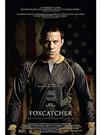|
|
||||
|
|
by Donald Levit  “I thought it was funny” the first time director Bennett Miller ran across the news item that has since become Toronto and now New York Film Festival selection Foxcatcher. Palpable disquieted press-screening Q&A response to that adjective alerted him and onstage cast to clarify, “funny until it wasn’t, the absurdity of this richest man” involving his elite class in this sport and behaving like that. The man in question was John E. du Pont (Steve Carell). Of that Inconceivable entrenched wealth commands kowtowing, manpower and killer artillery from the army and police at baronial A half-million 1980s dollars will cement U.S.O.C. compliance on Team Foxcatcher facilities. Fortune will also bring the trainees needed, who, if they hesitate, will be offered more, as in the eyes of privilege everyone has his price. One question posited in the crafted hundred thirty-three minutes is, at what cost and with what conditions do these wrestlers (and other underlings) give up or sell their personal autonomy and souls? Number one catch is Giving Mark star treatment, and positioning himself as more than a coach, as a friend and father figure, de Pont undercuts Dave and yet woos him to join the team as his “assistant” coach. Insulated from the cradle on by wildest entitlement, he lives in another world, a creepy odd duck. According to Ruffalo, “they designed [actor] John’s look to make him repellent, uncomfortable to be around, and everyone stayed away.” Du Pont turns Mark on to cocaine, gets him to fawn in public and, presenting it as opening up the twenty-seven-year-old’s self-esteem, drives a wedge between the two lifelong inseparable brothers. Seoul 1988 approaching, workouts intensify, the wealthy coach demands increasing dedication to winning and groveling adulation for himself, so tensions mount and come to a tragic but true head. Suppressed rage, paranoia and obsession are a volatile cocktail, and certainly so in this upsetting view of the rigors of athletics, whether unheralded or not, and even more of the lifestyle and near limitless power attaching to unimaginable unseen American old money zillions. (Released by Sony Pictures Classics and rated "R" for some drug use and a scene of violence.) |
||
|
© 2026 - ReelTalk Movie Reviews Website designed by Dot Pitch Studios, LLC |



